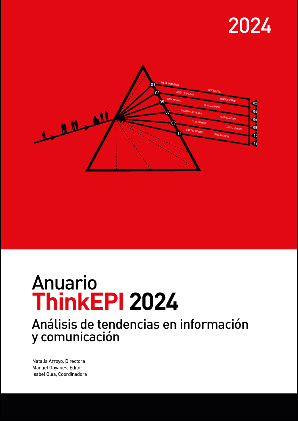Generative AI chatbots as sources of web traffic: web analytics insights from a journal portal
DOI:
https://doi.org/10.3145/thinkepi.2024.e18a31Keywords:
Artificial Intelligence, Generative AI Chatbots, Information behaviour, Bibliographic search, Academic journals, Web analytics, Google Analytics, SEO, GEO, ASEOAbstract
This paper is a reflection on the role of generative AI chatbots in the referred web traffic that reaches academic journals. Scenarios on informational search behaviour within the academic environment are explored, regarding the influence of these new tools based on Large Language Models (LLM) and on the generation of direct responses resulting from an iterative process of conversation with an AI chatbot. By exploring web analytics data obtained with Google Analytics for the RACO portal, a first approach is presented to the low volume of visits that, to date, it seems that academic journals are receiving from AI chatbots. Hypotheses are formulated to explain this low volume of traffic, assuming that the use of these AI tools is important and growing in the academic world. Finally, the role of Generative Engine Optimization (GEO) as a strategy for academic content optimization in generative AI-powered search tools is discussed, to decide whether it should be a suitable complement to the already established Academic Search Engine Optimization (ASEO) actions. Discussion is invited through a series of open questions on how new AI tools may be changing the landscape of bibliographic information search and use, and how that may affect scholarly journals in their visibility and optimization strategies for traffic acquisition.Downloads
References
Aggarwal, Pranjal; Murahari, Vishvak; Rajpurohit, Tanmay; Kalyan, Ashwin; Narasimhan, Karthik; Deshpande, Ameet (2024). “GEO: Generative Engine Optimization”. Proceedings of the 30th ACM SIGKDD Conference on Knowledge Discovery and Data Mining, pp. 5-16. https://doi.org/10.1145/3637528.3671900
Bains, Callum (2024). “The chatbot optimisation game: Can we trust AI web searches?”. The Guardian, 3 noviembre. https://www.theguardian.com/technology/2024/nov/03/the-chatbot-optimisation-game-can-we-trust-ai-web-searches
Bergstrom, Tracy; Ruediger, Dylan (2024). A third transformation? Generative AI and scholarly publishing. Ithaka S+R. https://doi.org/10.18665/sr.321519
Connaway, Lynn-Sillipigni; Dickey, Timothy J.; Radford, Marie L. (2011). “‘If it is too inconvenient I’m not going after it:’ Convenience as a critical factor in information-seeking behaviors”. Library & information science research, v. 33, n. 3, pp. 179-190. https://doi.org/10.1016/j.lisr.2010.12.002
Cruz-Argudo, Francisco; García-Varea, Ismael; Martínez-Carrascal, Juan A.; Ruiz-Martínez, Antonio; Ruiz-Martínez, Pedro M.; Sánchez-Campos, Alberto; Turró-Ribalta, Carlos (2024). La inteligencia artificial generativa en la docencia universitaria: Oportunidades, desafios y recomendaciones. CRUE. https://www.crue.org/wp-content/uploads/2024/03/Crue-Digitalizacion_IA-Generativa.pdf
Deschenes, Amy; McMahon, Meg (2024). “A survey on student use of generative AI chatbots for academic research”. Evidence based library and information practice, v. 19, n. 2. https://doi.org/10.18438/eblip30512
Gorichanaz, Tim (2024). “Virtuous search: A framework for intellectual virtue in online search”. Journal of the Association for Information Science and Technology, v. 75, n. 5, pp. 538-549. https://doi.org/10.1002/asi.24832
Goyanes, Manuel; Lopezosa, Carlos (2024). “ChatGPT en ciencias sociales: Revisión de la literatura sobre el uso de inteligencia artificial (IA) de OpenAI en investigación cualitativa y cuantitativa”. Anuario ThinkEPI, v. 18, e18e04. https://doi.org/10.3145/thinkepi.2024.e18a04
Gordillo-Bernárdez, Saül (2024). “Àlex Hinojo Sánchez. Director de projectes digitals i activista del coneixement lliure. Viquipèdia davant la IA: Entre la resistència i la irrellevància”. El Punt Avui, 11 noviembre. https://www.elpuntavui.cat/societat/article/15-ciencia/2477475-viquipedia-davant-la-ia-entre-la-resistencia-i-la-irrellevancia.html
Kumar, Aounon; Lakkaraju, Himabindu (2024). Manipulating large language models to increase product visibility. arXiv (No. arXiv:2404.07981). http://arxiv.org/abs/2404.07981
Li, Xiaoxi; Jin, Jiajie; Zhou, Yujia; Zhang, Yuyao; Zhang, Peitian; Zhu, Yutao; Dou, Zhicheng (2024). From matching to generation: A survey on generative information retrieval. arXiv (No. arXiv:2404.14851). https://doi.org/10.48550/arXiv.2404.14851
Lopezosa, Carlos; Goyanes, Manuel (2024). “Evaluación del uso ético de ChatGPT en investigación científica: Principales tendencias, mejores prácticas y desafíos identificados”. Anuario ThinkEPI, v. 18, e18e19. https://doi.org/10.3145/thinkepi.2024.e18a19
Messeri, Lisa; Crockett, M. J. (2024). “Artificial intelligence and illusions of understanding in scientific research”. Nature, v. 627, pp. 49-58. https://doi.org/10.1038/s41586-024-07146-0
Miao, Fengchun; Holmes, Wayne (2023). Guidance for generative AI in education and research. Unesco. https://doi.org/10.54675/EWZM9535
Nafría, Ismael; Nafría, Clara (2024). “OpenAI lanza ChatGPT Search, su buscador web con IA”. Hoy en internet, 17 junio. https://hoyeninternet.beehiiv.com/p/openai-lanza-chatgpt-search-su-buscador-web-con-ia
Potthast, Martin; Hagen, Matthias; Stein, Benno (2020). “The dilemma of the direct answer”. ACM SIGIR Forum, v. 54, n. 1, pp. 1-12. https://doi.org/10.1145/3451964.3451978
Smith, Brad (2024). “Google AI Overviews are an evolution, not a revolution”. Search engine land, 25 junio. https://searchengineland.com/google-ai-overviews-evolution-revolution-443454
Strzelecki, Artur; Rutecka, Paulina (2020). “Direct answers in Google search results”. IEEE Access, v. 8, 103642-103654. https://doi.org/10.1109/ACCESS.2020.2999160
Via, Anna (2023). “From ancient oracles to Generative AI. A story about human’s desire to predict and influence the future”. Medium, 3 diciembre. https://medium.com/artificial-corner/from-ancient-oracles-to-generative-ai-da86f64e0494
Vitela-Caraveo, Alex; Urbano, Cristóbal (2020). “Web analytics for open access academic journals: Justification, planning and implementation”. BiD: Textos Universitaris de Biblioteconomia i Documentació, v. 45, n. 8. https://doi.org/10.1344/BiD2020.45.20
Withorn, Tessa (2023). “Google SGE: A new way to search, teach, and resist”. College & research libraries news, v. 84, n. 10. https://doi.org/10.5860/crln.84.10.373
Downloads
Published
How to Cite
Dimensions


